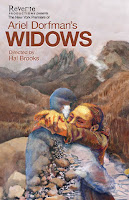Reverie Productions, "Widows"

Trilogy playwright Johnna Adams and I went to the opening of Ariel Dorfman’s Widows at Reverie Productions, and it was a wonderful opportunity to see the kind of ambitious, globally-engaged work an Indie theatre is capable of reaching for and accomplishing. HUZZAH to a company willing to premiere a play with a cast this big, and with themes this timely and difficult. With America in Iraq and Afghanistan from anywhere to a few years (Democrats win in November) to a hundred (McCain wins); the human cost of a military occupation is something theatre needs to explore.
That cost manifests itself most theatrically in a stunning moment at the end of the play. A grandmother who has seen her children, husband and father ‘disappeared’ by a military regime is given a choice by the local captain: give over your protest, or condemn your grandson to death. What is so stunning about this moment is that throughout the play, The Captain (well played by Mark Alhadeff) is forced to navigate a number of difficult choices between what is right on the individual human level, and what is necessary for his military to keep the peace. In spite of his best intentions, the horrors of the past, brought to light by the widows of the village, continually force his hand to commit further atrocities.
In this final moment, however, he thrusts that choice into the grandmother Sofia Fuentes’ (beautifully played by Ching Valdes-Aran) hands. She can no longer simply be the righteous suffering woman. She now literally holds her grandson’s life in her hands. Her choice, which I will not spoil here, cannot simply be called a false choice, because the Captain has made it clear that if past horrors can be kept in the past, then he can be kind, and there can be progress. But Sofia refuses that pact with this equivocating devil, and in doing so, provokes his further violence, until at the last, the moral difference between them becomes blurred. Who is morally right – the Captain trying to hide the evils of the past to move forward; or Sofia, forcing those evils to the light of day at the cost of potentially perpetuating them?
The similarities between the difficult choices faced every day by our military and the civilians they occupy is a parallel that makes this play often uncomfortable to watch, though some aesthetic distance is granted by Dorfman’s decision to give the play a Greek chorus in the widows of the village.
What is fascinating is how this aesthetic distancing rubs up against the claustrophobic staging by Hal Brooks. The audience sits within breathing distance of the action, so that when a character points a gun, we are well within firing range; and when dead bodies are hauled out of a river, we can see the actresses faces straining with the weight. There is real bread and real dirt on an otherwise elegantly simple thrust set; and the grit of the bread and dirt and weight of the bodies sparks nicely against the lofty, stylized agony of the widows.
Also exciting was to see Melissa Miller, so excellent in Ken Urban’s Private Lives of Eskimos, working well in a very different vein here.
The reviews of this production have ranged from the very positive of our own Johnna Adams‘ blog to the highly critical; but as an Artistic Director of a small company yearning to see Indie theatre take bigger risks and reach outside our collectively ironic navel, this earnest night of political theatre was well worth applauding.




Recent Comments